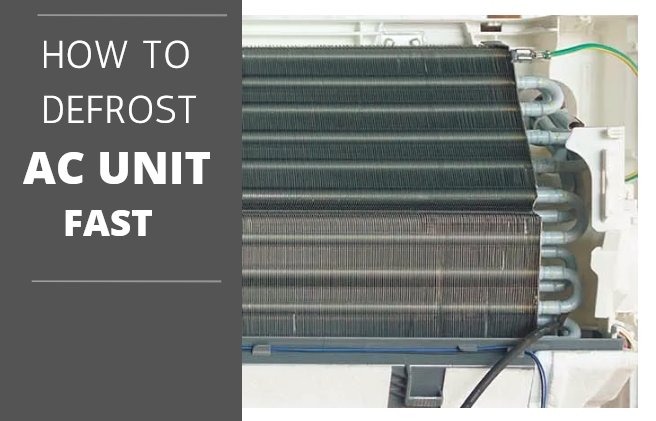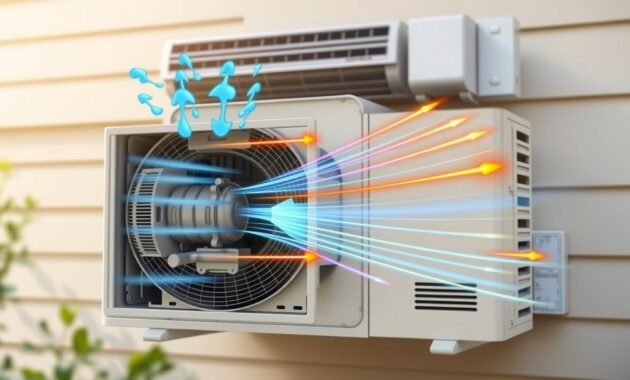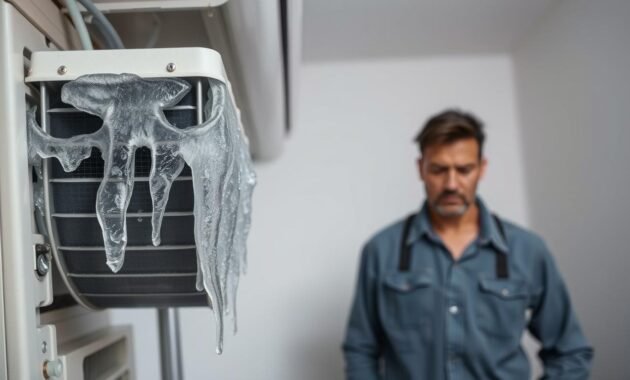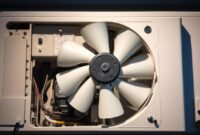Are you looking at a frozen air conditioning unit and wondering how to fix it? Many people think using heat to defrost it is a good idea. But, this can actually harm your cooling system.
When your AC freezes, it’s natural to want to fix it fast. Some might suggest using heat to defrost it. But, HVAC experts advise against this because it’s risky.
Read also: 3 Causes of Outside Air Conditioner Unit Frozen
Instead, I’ll show you safe and effective ways to deal with a frozen AC unit. If you’re not sure what to do, it’s best to call a professional. They can fix the problem without causing more damage.
Understanding Why Your AC System Freezes Up
Air conditioning systems can unexpectedly develop ice buildup. This creates frustrating cooling problems for homeowners. Knowing why your AC freezes helps prevent damage and keeps it running well.
Several factors contribute to your air conditioner freezing. Moisture in the air is a big part of this process. Cold air and system dynamics also play a role in unexpected ice formation.

Common Culprits Behind AC Freezing
- Low refrigerant levels disrupting heat transfer
- Restricted airflow from clogged air filters
- Blocked return vents preventing proper air circulation
- Malfunctioning thermostats misreading temperature
- Dirty evaporator coils reducing heat exchange efficiency
Temperature and Moisture Interactions
When moisture in the air meets cold surfaces in your AC unit, ice forms quickly. Not keeping up with maintenance makes these freezing problems more likely.
Dirty Air Filters: A Hidden Threat
Ignoring air filters can hurt your system’s performance. Clogged filters block airflow, leading to temperature imbalances and ice buildup. Replacing filters regularly stops these freezing issues.
By understanding these key factors, you can protect your AC from freezing. This keeps your cooling system running smoothly.
Signs Your Air Conditioner Needs Defrosting
Knowing when your air conditioner needs defrosting can prevent expensive repairs. If you’re wondering if you can turn on AC for heat in winter, it’s important to spot the warning signs of a frozen unit.
Your AC might be freezing if you see these signs:
- Reduced cooling efficiency
- Visible ice formation on the outdoor unit
- Warm air blowing from air vents instead of cool air
- Unusual frost or ice buildup around refrigerant lines
- Strange humming or buzzing sounds from the system
If you notice these symptoms, don’t worry. Knowing if you can turn on your AC in winter needs careful thought. A frozen AC unit often shows problems like poor airflow, refrigerant issues, or mechanical failures.
Check your system’s outside parts for ice. Ice buildup stops your AC from working right. It blocks heat exchange, hurting the cooling process.
Act fast. Ignoring these signs can cause more damage and cost a lot to fix. By being quick to address freezing issues, you keep your AC working well and make it last longer.
Can I Turn on Heat to Defrost AC?
When your air conditioner freezes up, you might wonder about quick fixes like turning on heat to defrost the system. As an HVAC expert, I want to clarify why this approach is not recommended for resolving AC freezing issues.
The Science Behind Using Heat
Trying to defrost your AC with heat can actually cause more harm than good. The cooling system is designed to work under specific conditions. Adding heat directly can potentially damage critical components.
- Heat can cause rapid temperature changes
- Sudden expansion might crack delicate AC parts
- Uncontrolled defrosting risks permanent system damage
Potential Risks and Benefits
While you might think turning defrost on is simple, professional methods are safer. Risks include electrical damage, refrigerant line issues, and lowering system efficiency.
Read also: Common Causes for Air Conditioner Fans Not Spinning
When to Avoid This Method
I strongly advise against using heat to defrost your AC in these scenarios:
- When ice buildup is extensive
- If you lack technical understanding of AC systems
- During warranty periods that might be voided
- When electrical components are exposed
The safest approach is always to contact a professional HVAC technician. They can diagnose and resolve freezing issues without risking further damage to your air conditioning system.
Safe Methods to Thaw a Frozen Air Conditioner
Dealing with a frozen air conditioner can be frustrating. But, I’ll show you safe ways to defrost it without harming your system. Knowing how long to let ac defrost is key to avoiding damage and getting your unit working right again.
The first step is to turn off the cooling system completely. Running the fan helps air circulate and defrost faster. Here are the best methods:
- Turn off the cooling mode and switch to fan-only mode
- Allow natural defrosting for 2-3 hours
- Keep the area around the AC unit clear of obstructions
- Check air filters and remove any visible ice buildup
Will turning on the heat unfreeze ac? No, it’s not recommended. Using heat can harm sensitive parts. Instead, be patient. Most AC units defrost naturally in a few hours when the cooling is off and air moves well.
Pro tip: If your AC keeps freezing, it might have deeper issues. This could be low refrigerant, blocked air filters, or mechanical problems. In such cases, getting a professional HVAC technician is the safest way to find and fix the problem.
Remember, gentle and gradual defrosting keeps your air conditioning system safe. By using these safe methods, you can thaw your frozen AC without risking costly repairs.
How Long Does It Take for an AC to Defrost?
Defrosting an air conditioner takes time and patience. The time it takes to thaw your AC can change a lot. This depends on several important factors.
A frozen AC can thaw in 2 to 24 hours. The exact time depends on many things, like the environment and the AC itself.
Factors Influencing Defrosting Duration
- Extent of ice buildup
- Ambient temperature
- Humidity levels
- AC unit size and type
Optimal Defrosting Conditions
To defrost your AC well, turn off the cooling and use a fan. Does defrost use AC? No, you need to stop using the AC while it thaws.
| Defrosting Condition | Estimated Time | Recommended Action |
|---|---|---|
| Light Ice Buildup | 2-6 hours | Use room temperature fan |
| Moderate Ice Buildup | 6-12 hours | Ensure good air circulation |
| Heavy Ice Buildup | 12-24 hours | Consider professional inspection |
Can I turn my AC back on after it thaws? Wait until it’s dry and ice-free. Check for water damage or drainage issues before starting it again. If unsure, get an HVAC expert’s help to avoid damage.
The Role of Proper Air Flow in Preventing Freezing

Keeping your air conditioning system running well is key. It stops unexpected freezing. If your AC’s airflow gets blocked, ice can form in the system.
Many homeowners face AC problems because of airflow issues. The drain line is very important here. Without good airflow, your system works too hard, leading to ice.
- Check air filters monthly for debris and dust
- Ensure all vents are open and unobstructed
- Clean around outdoor unit to prevent blockages
- Inspect drain line for possible clogs
Knowing about airflow can save you money. Blocked vents, dirty filters, and clogged drain lines are bad for your AC. Regular checks keep your AC working right and stop freezing.
Just a few minutes of checking each month can help a lot. It lowers the chance of AC failures and makes your cooling last longer.
Understanding Your AC’s Defrost Cycle
Air conditioning systems have changed a lot in recent years. Modern defrost technologies are more efficient and smart. Knowing how they work helps keep your AC running well and avoids damage.
Modern Defrost Systems: A Technological Leap
Today’s heat pumps have advanced defrost systems. They are much different from old methods. These systems use smart sensors to find frost and start defrosting when it’s needed.
- Sensors monitor frost levels in real-time
- Automatic activation reduces energy consumption
- More precise frost management
Automatic Defrost Features Explained
Most modern systems turn defrost on automatically. They look at many things before starting the defrost cycle:
| Feature | Function |
|---|---|
| Temperature Monitoring | Tracks outdoor and indoor temperatures |
| Humidity Sensors | Detects moisture levels that might cause frost |
| Defrost Duration Control | Limits defrost cycle to prevent unnecessary energy use |
If you’re not sure about your system, it’s time to call a pro. An HVAC technician can explain your AC’s defrost system and make sure it’s working right.
Even though these systems manage themselves, a pro check-up now and then is good. It can stop problems and make your AC last longer.
Preventive Maintenance to Avoid Freezing
To keep your air conditioning system from freezing, you need to take care of it early. Knowing how moisture and cold air affect your AC is key. This knowledge helps avoid expensive repairs and keeps your system running longer.
I suggest a detailed maintenance plan to fight off freezing risks. Regular checks and easy steps can save you a lot of money and time later on.
- Check and replace air filters every 30-90 days
- Clean AC coils quarterly to prevent dirt buildup
- Ensure proper air circulation around the unit
- Monitor refrigerant levels
- Keep outdoor units clear of debris and vegetation
Keeping your home’s temperature steady is important for your AC. High humidity can lead to freezing issues. Using a dehumidifier in humid seasons helps control moisture indoors.
Getting your AC checked by a pro every year is essential. An HVAC expert can do thorough inspections, check refrigerant, and spot problems early. These steps help avoid freezing and keep your AC efficient.
By following these steps, you can lower the chance of your AC freezing. This ensures your home stays cool and comfortable all summer.
When to Call a Professional HVAC Technician
Knowing when to call a pro for your AC can save you money and prevent damage. Some small AC problems can be fixed at home. But, some issues need a pro’s help.
As someone who’s been around the block, I’ve learned when to call a pro. It’s key to avoid big damage to your AC. There are times when you really need a pro’s help.
Emergency Situations Requiring Immediate Attention
Some situations need help right away:
- Persistent refrigerant leaks
- Complete system shutdown
- Strange burning smells
- Electrical issues near the drain line
- Unusual noises during operation
Professional Diagnosis and Repair
Pro HVAC techs have the tools and know-how for tough problems. When you call them, they can:
- Do a full system check
- Find hidden problems in the drain line
- Fix things right
- Give tips on keeping your AC in top shape
Trying to fix big problems yourself can make things worse. Always trust certified pros to fix your AC safely and right.
Common Mistakes to Avoid During Defrosting

Defrosting an air conditioner might seem simple, but many homeowners make big mistakes. These errors can harm their cooling system. It’s important to be careful and avoid quick fixes that can make things worse.
One big mistake is using sharp objects to remove ice. This can damage the cooling coils, leading to costly repairs. Tools like screwdrivers, knives, or ice picks might seem helpful, but they can actually harm your system.
- Never use sharp tools to remove ice from AC components
- Avoid turning on heat to defrost AC immediately
- Don’t rush the defrosting process
- Prevent touching electrical components
Another mistake is trying to turn on the heat too fast to defrost the AC. It’s important to be patient when dealing with ice buildup. Rushing can put too much stress on the compressor and cause bigger problems.
| Mistake | Potential Damage | Recommended Action |
|---|---|---|
| Using Sharp Objects | Coil Punctures | Use Gentle Defrosting Methods |
| Rapid System Restart | Compressor Stress | Wait 30-60 Minutes Before Restarting |
| Ignoring Underlying Causes | Repeated Freezing | Check Air Filters and Refrigerant Levels |
Professional HVAC technicians suggest letting your system defrost naturally. If you keep getting ice buildup, it might mean there’s a bigger problem with your air conditioning. This could need expert help.
Important Safety Precautions During Defrosting
When you’re dealing with a frozen air conditioning system, safety comes first. It’s key to protect yourself and your AC unit. Moisture in the air can make things harder during defrosting.
- Always turn off power to the AC unit at the circuit breaker
- Wear protective electrical safety gloves
- Keep the work area dry and free from water accumulation
- Avoid direct contact with electrical components
Read also: How to Fix a Stuck Relay on AC Unit with an Easy Way
Electrical Safety Measures
Working with air conditioning systems comes with electrical risks. It’s vital to protect yourself from shocks. If you’re not sure about electrical connections, it’s best to call a professional.
| Safety Action | Recommended Procedure |
|---|---|
| Power Disconnection | Complete shutdown at main circuit breaker |
| Personal Protection | Wear insulated electrical safety gloves |
| Professional Assistance | Contact HVAC technician for complex issues |
Protecting AC Components
AC components can be damaged during defrosting. Moisture can cause corrosion and electrical issues. Use gentle defrosting methods and avoid direct heat to keep the system safe.
- Never use sharp objects to remove ice
- Avoid applying direct heat to sensitive components
- Allow natural thawing when possible
- Inspect components for damage after defrosting
If you’re unsure, it’s safest to call a professional. They can fix AC freezing issues without damaging your system.
Conclusion
Knowing how to deal with a frozen air conditioner can save you a lot of money and prevent damage. When you ask, “Can I turn on heat to defrost AC?” the answer is clear. It’s best to call a professional for safety and to avoid long-term problems.
Regular maintenance is key to avoiding freezing issues. I suggest getting a professional to check your AC every year. They can spot problems early. Also, make sure to change air filters, check for airflow, and keep an eye on refrigerant levels.
If your AC keeps freezing, don’t wait to call an HVAC technician. They can find problems that you can’t see. By acting fast and getting help, you’ll make your AC last longer and work better.
Being informed and taking action early is your best defense against AC freezing. Stay up to date, do regular maintenance, and call pros when needed. Your comfort and your AC’s health depend on these smart steps.


